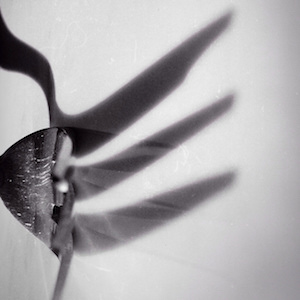Dawn Manning on Debra Wierenga’s Poem “Fork”
Today’s post is written by Dawn Manning. We published her poetry commentary “A Closer Look at ‘Self-Portrait as Eve’ by Debra Wierenga” in our Fall 2016 issue.
The following is Manning’s commentary on a second poem by Wierenga.
*
“Fork,” the poem placed in the middle of Marriage and Other Infidelities, is a strong example of Debra Wierenga’s skillfulness with the Shakespearean sonnet:
Fork
Spoleto. Twenty-five winters ago
I chose this stainless as much for its name
as for its feel in my hand—balanced, cool,
evocative of olive tree terrain
and stilettos. It was the only thing
I registered, so friends and family
gave us service for twelve on our wedding
day. Now that I have cutlery custody,
I notice what’s missing, and at replacements
dot com find just how much it would cost
to recomplete our set. Such sentiment’s
not cheap! Hard to measure what’s really lost,
I’ve found—in a pattern this extensive,
perfection gets only more expensive.
The one-word title does an incredible amount of leg work—evoking not only cutlery, but the speaker’s forked road at the dissolution of her marriage, and the forked tongues darting in this collection’s opening poem, “Self-Portrait as Eve,” as well as flicking their way through the lies uncovered in other sonnets. This poem’s place at the center of these sonnets featuring so many forks is no coincidence. Even the structure here is forked: each line an enjambed prong laid out into steely quatrains.
This enjambment works to separate wedding from its fleeting day, replacements from its dot com locale, and lost from what might be found. And yet there is a further complication at work here, knotting the pattern of the poem into a neat tangle. The eye immediately doubles back to connect the stilettos in line five with the Spoleto in line one, and in the third strophe, recomplete clamors back to replacements two lines earlier.
Much of this poem’s movements are oblique. An entire divorce is compacted into the word custody. The speaker seems unable to bear the whole of anything: twenty-five years is pared down to winters, silverware is reduced to its glinting surface of stainless. These disembodied parts sharpen the reader’s view of the poem with their microscopic gaze.
But the forks are everywhere. “Our set” and “what’s missing” split their tines between silverware and a family unit. And though the poem ends with a perfect rhyme, we’re no longer deceived by the tinkling. We’ve heard the off notes, we know nothing remains untarnished.
About the Poets
Dawn Manning is the author of Postcards from the Dead Letter Office. Her awards for poetry include the Beullah Rose Poetry Prize, the Edith Garlow Poetry Prize, and the San Miguel Writing Award, among others. Her poems have been published through Crab Orchard Review, Silk Road Review, Smartish Pace, and other literary journals.
Debra Wierenga’s chapbook, Marriage and Other Infidelities, is available from Amazon.com. Her poems have appeared in Nimrod, Measure, The Literary Review, and other journals. Her work has also appeared in Verse Daily and American Life in Poetry.









